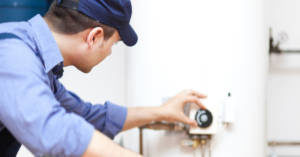An Exhaustive Guide to Water Heaters | Len The Plumber
 Shopping for a water heater can feel a little overwhelming. Water heaters come with a surprising number of options, features, and styles. What’s the difference between different styles of water heater, and why does that difference matter? What makes one water heater better suited for your home than another? What should you consider when you’re trying to buy a water heater?
Shopping for a water heater can feel a little overwhelming. Water heaters come with a surprising number of options, features, and styles. What’s the difference between different styles of water heater, and why does that difference matter? What makes one water heater better suited for your home than another? What should you consider when you’re trying to buy a water heater?
We’ve put together this guide to water heaters to help make sure you have all the info you need to choose a water heater that’s right for you. Even if you don’t need a water heater now, this is the kind of information you’ll want to have when you do.
Types of Water Heater
We’ll start with the basics. There are three main varieties of water heater you can choose from:
1. Storage Tank Water Heaters
Storage tank water heaters are the most “traditional” and widely-used water heater. These water heaters heat water in a large, insulated tank and store it until it’s needed. Most storage tank water heaters use either gas or electricity as a power source.
Storage tank water heaters are so widely used because they come in a wide variety of sizes. No matter what your home’s hot water needs, there’s almost certainly a storage tank water heater for you. They’re also consistent: as long as there’s hot water in the tank, you can access hot water immediately.
2. Tankless Water Heaters
Tankless heaters don’t have a tank and don’t store water. Instead, they contain special coils that heat water on demand. Unlike storage tank heaters, the only time a tankless heater uses any power is when it’s actively used. Consequently, tankless heaters are considerably more energy-efficient than other models. They’re also easier on your power bill!
Tankless heaters aren’t without their limitations, however. Storage tank heaters store lots of hot water in reserve. You won’t “run out” of hot water until you’ve depleted all the water held in the storage tank. Tankless heaters, on the other hand, have to heat all the hot water you get at once. That means they may struggle to reliably provide hot water to multiple fixtures at once. Ultimately, tankless water heaters are more cost-effective and efficient than storage tank water heaters.
3. Hybrid Water Heaters
Hybrid heaters take ambient heat from the air around them and use it to heat the water inside. They’re much more energy efficient than standard electric water heaters, but they have their own limitations too. Hybrid heaters need to be placed somewhere warm, so they can be pull heat from the air. They also tend to be big and unwieldy, which may make them difficult to install in a convenient place.
What You Should Consider When Buying a Water Heater
Next time you’re in the market for a water heater, keep these three questions in mind. Answering these questions will help ensure you end up with the appropriate heater for your needs.
How much hot water do you use?
For storage-tank water heaters, the determination is called FHR, or first-hour rating. For tankless water heaters, it’s called the GPM rating, or gallons-per-minute. These numbers will tell you how much heated water the device can give during a specific period of time. Typically, tank-heaters are going to come in varieties of up to 55 gallons and over 55 gallons. Before you make any other choice, determine how much hot water you use during a day and how much you use at a given time, and go from there.
How long is the warranty?
Warranties for water heaters tend to vary between two to twelve years. Longer-warranty models cost more, but they tend to have better heating elements and insulation. We always recommend choosing the longest warranty you can find. The longer the warranty, the longer your heater will last.
What kind of features are you interested in?
Contemporary water heaters come with all kinds of bells and whistles. Some water heaters include digital displays that monitor levels of scale and other contaminants within the tank. Others give you precise control over your hot water temperature. You can even control exactly when some water heaters turn on and off.
Additional features like these can be very helpful, but they also come at an additional cost. Weigh your options and ask questions to end up with the best possible heater for you.
Want to talk to an expert and take the next step toward choosing and installing a new water heater? Get in touch with the experts at Len The Plumber. We have the knowledge and experience to help you every step of the way.
From Len The Plumber Heating & Air



